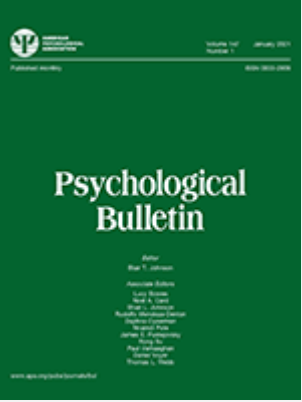Parents favor daughters: A meta-analysis of gender and other predictors of parental differential treatment.
IF 19.8
1区 心理学
Q1 PSYCHOLOGY
引用次数: 0
Abstract
Decades of research highlight that differential treatment can have negative developmental consequences, particularly for less favored siblings. Despite this robust body of research, less is known about which children in the family tend to be favored or less favored by parents. The present study examined favored treatment as predicted by birth order, gender, temperament, and personality. We also examined whether links were moderated by multiple factors (i.e., parent gender, age, reporter, domain of parenting/favoritism). Multilevel meta-analysis data were collected from 30 peer-reviewed journal articles and dissertations/theses and 14 other databases. In all, the data reflected 19,469 unique participants (Mage = 19.57, SD = 13.92). Results showed that when favoritism was based on autonomy and control, parents tended to favor older siblings. Further, parents reported favoring daughters. Conscientious and agreeable children also received more favored treatment. For conscientious children, favoritism was strongest when based on differences in conflict (i.e., more conscientious children had relatively less conflict with their parents). Parents and clinicians should be aware of which children in a family tend to be favored as a way of recognizing potentially damaging family patterns. (PsycInfo Database Record (c) 2025 APA, all rights reserved).父母偏爱女儿:性别和父母差别对待的其他预测因素的荟萃分析。
几十年的研究强调,差别待遇可能会对孩子的发育产生负面影响,尤其是对不那么受宠爱的兄弟姐妹。尽管有大量的研究,但对于家庭中哪些孩子更受父母青睐,哪些孩子更不受父母青睐,我们知之甚少。本研究考察了出生顺序、性别、气质和个性所预测的优待待遇。我们还研究了这种联系是否受到多种因素(即父母性别、年龄、记者、养育领域/偏袒)的调节。多层元分析数据收集自30篇同行评议的期刊论文和学位论文以及14个其他数据库。总的来说,数据反映了19,469个独立参与者(Mage = 19.57, SD = 13.92)。结果表明,当偏爱是基于自主和控制时,父母倾向于偏爱年长的兄弟姐妹。此外,据报道,父母更偏爱女儿。有责任心和随和的孩子也得到了更多的优待。对于有责任心的孩子来说,基于冲突差异的偏袒是最强烈的(即,更有责任心的孩子与父母的冲突相对较少)。父母和临床医生应该意识到在一个家庭中哪些孩子倾向于被偏爱,以此来识别潜在的有害的家庭模式。(PsycInfo Database Record (c) 2025 APA,版权所有)。
本文章由计算机程序翻译,如有差异,请以英文原文为准。
求助全文
约1分钟内获得全文
求助全文
来源期刊

Psychological bulletin
医学-心理学
CiteScore
33.60
自引率
0.90%
发文量
21
期刊介绍:
Psychological Bulletin publishes syntheses of research in scientific psychology. Research syntheses seek to summarize past research by drawing overall conclusions from many separate investigations that address related or identical hypotheses.
A research synthesis typically presents the authors' assessments:
-of the state of knowledge concerning the relations of interest;
-of critical assessments of the strengths and weaknesses in past research;
-of important issues that research has left unresolved, thereby directing future research so it can yield a maximum amount of new information.
 求助内容:
求助内容: 应助结果提醒方式:
应助结果提醒方式:


